
Ferenc Puskás was a Hungarian footballer and manager, widely regarded as one of the greatest players of all time and the sport's first international superstar. A forward and an attacking midfielder, he scored 84 goals in 85 international matches for Hungary and later played four international matches for Spain as well. He became an Olympic champion in 1952 and led his nation to the final of the 1954 World Cup. He won three European Cups, ten national championships and eight top individual scoring honors. Known as the "Galloping Major", in 1995, he was recognized as the greatest top division scorer of the 20th century by the IFFHS. Scoring 806 goals in 793 official games during his career, he is the seventh top goal scorer of all time by the RSSSF.

György Kurtág is a Hungarian composer of contemporary classical music and pianist. According to Grove Music Online, with a style that draws on "Bartók, Webern and, to a lesser extent, Stravinsky, his work is characterized by compression in scale and forces, and by a particular immediacy of expression". In 2023 he was described as "one of the last living links to the defining postwar composers of the European avant-garde".
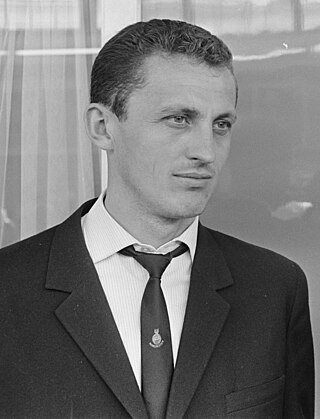
Flórián György Albert was a Hungarian professional football player, manager and sports official, who was named European Footballer of the Year in 1967. Nicknamed "The Emperor", he played as a forward, and has been described as one of the most elegant footballers of all time.

György Sárosi was a Hungarian footballer. Sárosi was a complete footballer renowned for his versatility and technique among other things, and he played in several positions for Ferencváros and the Hungary national team. Essentially a second striker, he could also operate in midfield or central defence, and he helped Ferencváros win five Hungarian league titles between 1932 and 1941. He is considered one of the greatest players of the pre-war era.

Lajos László Détári is a Hungarian football manager and former player who played as a midfielder. At the height of his career (1984–1994), he was a well-respected player throughout Europe, winning "Player of the Year" titles in Hungary, Greece and Switzerland.

György Bognár is a Hungarian professional football manager and former player, who is currently the manager of Nemzeti Bajnokság I club Paks.

Ferenc Hirzer known in Hungarian as Ferenc Híres was a Hungarian football player and manager, who played as a forward during the 1910s and 1920s; he is perhaps best known for his time with Italian side Juventus. He also played for the Hungary national football team thirty-three different times, scoring fourteen goals.
László Nagy is a retired Hungarian footballer who played for Újpesti Dózsa. Nagy is most famous for his participation in the gold medal-winning Hungarian team in the 1968 Summer Olympics, and for playing at the 1978 FIFA World Cup. He played 25 games and scored 7 goals for the Hungary national team. He also played a season for FC Locarno.
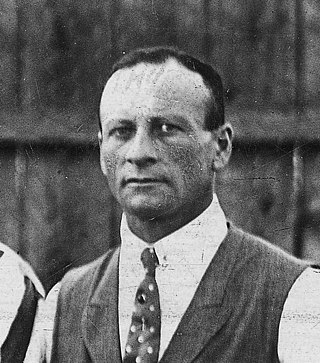
Imre Pozsonyi was a Hungarian football player and manager.

Sándor Egervári is a Hungarian football manager and former player.

György Kottán, also referred to as a Georg Kottán or George Kottán, was a Hungarian-Austrian football manager and player. Kottan is regarded as the most influential coach in the history of Bangladeshi football. He guided the Bangladesh national team to their first SAFF Championship in 2003. Additionally, he holds the record for being the only coach to win the Bangladesh Premier League as an undefeated champion, with Abahani Limited Dhaka in 2016.

Attila Balázs is a Hungarian former professional tennis player. He has a career-high singles ATP ranking of No. 76 achieved on 2 March 2020. He is a seven time Hungarian National Tennis Champion; after Béla von Kehrling, József Asbóth and István Gulyás. He is the fourth Hungarian player who was able to win at least 6 consecutive National Championships.
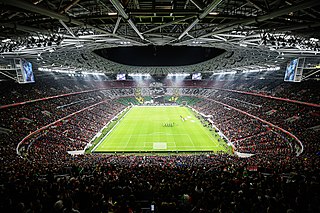
Puskás Aréna is a football stadium in the 14th district (Zugló) of Budapest, Hungary. The stadium's construction started in 2017 and was finished before the end of 2019. It is an all-seater with a capacity of 67,215. The Hungarian Football Federation meets all UEFA and FIFA stadium requirements, and was awarded 4-stars by the UEFA. The stadium is built in the place of the former Ferenc Puskás Stadium whose demolition was completed in October 2016. Both stadiums were named in honour of the former national team captain Ferenc Puskás (1927–2006).

Zoltán Opata was a Hungarian football player and manager. As a player, he won six Hungarian league championships with Budapest-based side MTK in the 1920s and regularly appeared for Hungary national football team. After retiring from playing he became a manager and had successful spells with clubs in Yugoslavia, Romania and Poland.
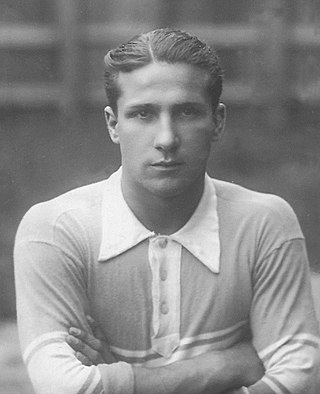
Iuliu Bodola was a Romanian-Hungarian footballer who played as a striker. He represented both the Romania and Hungary national team at internationally level. His nickname was Duduş/Dudus. He is Romania's third all-time top goalscorer, and he is also the all-time top goal scorer of the Balkan Cup.

György Babolcsay was a Hungarian football player and manager.
Vilmos Wilheim was a Hungarian football manager and former player.
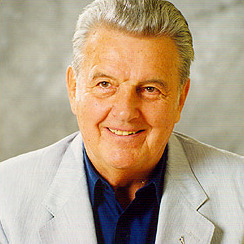
György Pásztor was a Hungarian ice hockey player and sports administrator. He won four Hungarian championships as a player, and was a member of the Hungary men's national team. He later served as president of the Hungarian Ice Sports Association, helped establish the Hungarian Ice Hockey Federation, and was a member of the Hungarian Olympic Committee. He was a delegate to the International Ice Hockey Federation, and was chairman of its medical committee for 12 years, overseeing tests for doping in sport. He was inducted into both the IIHF Hall of Fame, and the Hungarian Ice Hockey Hall of Fame. He was made an officer of the Hungarian Order of Merit in 2003, and was referred to as "Mr. Hockey" in Hungary.

Márta Kurtág was a Hungarian classical pianist and academic piano teacher. She was the wife of György Kurtág, with whom she performed for 60 years, including at international festivals. They often played from his collection Játékok, which they also recorded together.

György Gálhidi is a retired Hungarian footballer and manager. As a footballer, he would be primarily associated with playing for Csepel as he would be one of the club's primary players throughout the 1980s. He would be more well known for his managerial career, coaching various Hungarian clubs throughout various seasons of the Nemzeti Bajnokság II where he was commonly recognized as a manager who had the talent to promote clubs of the second division to the top leagues of their respective nations.



















